, 0°
Wind: mph,


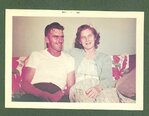

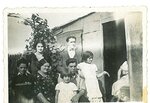
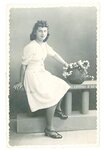
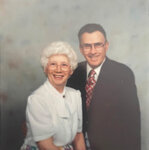
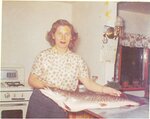
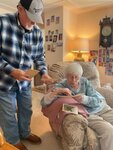

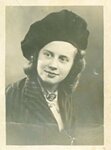
Cleaver Managing Editor
HARRISON – Few writers have an opportunity to sit down with someone who was so integral a part of history as the fabled “War Brides” of the 1940s. That all changed last year as I was considering doing a series of interviews with centenarians, those that have reached 100 years of age. I didn’t find anyone 100 or over to interview, but I did have the honor of interviewing Paulette Sharp on April 7, 2023, and at the time she was 98 years old.
Paulette Sharp was born Paulette Camille Zurecki on Jan. 31, 1925, to Ladislas Zurecki and Jeanne Virginie (Tissier) Zurecki in Montceau-Les-Mines, France.
Paulette’s mother was French, and her father was Polish and French. Paulette was raised Catholic and later became a Lutheran. With the coming of her teen years also came WWII, and although she was not Jewish, all of Europe was affected by the war.
“Before the war was a very good life,” said Paulette. “Things were good over there. During the war it was hard to find food and bad things happened. We saw some terrible things.
“My father was supposed to go to work [in the] south and we never got there because my father said we are not moving anymore because the Germans are nearer all the time.
“We stopped at this place,” she said. “We got to the town, they had a castle there and then we tried to find a barn to spend a few days in. We found a barn in the country and my dad went to talk to the people to see if we could stay there. There was a lot of straw in the barn, and we made mattresses and put down blankets. He drove the car inside because a German could take car. They took my dad’s bicycle, and they would steal anything they could get from you. At night we closed the doors to feel safer.
“We went to town every day to see if could get some bread and some meat – some food you know. We stayed there for about three weeks until the Germans caught up with us. The French had Senegalese troops from Africa, and they would sit along the sidewalks, and we were scared to walk by them as they looked so exhausted.”
One of those soldiers had an unusual necklace he made of the ears of Germans that he was going to take back to his wife in Africa.
“The French army was west of us and the Germans caught up with them,” she said. “They had a fierce battle down there and we could [hear] them screaming, men being hurt. Then the Germans came through and we didn’t dare move any further. Then there were evacuations and ambulances- to the hospital for the wounded.”
Paulette was just 14.
“Anyway, things calmed down and we waited another two weeks where we were at then we started back home,” she said. “We should have just stayed home in the first place, it would have been safer. I don’t like to talk about it, and I don’t have to think about it. It wasn’t a good time. When I came over here I was glad my children are raised over here. Where there wasn’t so much trauma. It’s quiet here. I never thought I would marry a GI. But the good Lord took care of us. You have to live with your faith. That’s all you have.”
Her family lived north of Paris during the war, near the river Seine.
“We were bombed and lost everything,” Paulette recalled. “My dad passed away after he had a heart attack at work.” Her father was just 47.
“I went to school until I was 16 and I graduated. I went back to private school to take shorthand and typing. I went to private school for six months and then I went to work at my first job when I was 17 in an office.” She also learned English in school.
“In school there was this Charlotte [Charlotte Feigenbaum or possibly spelled Fajgenblat] she was Jewish. For some reason she wanted to sit by me. She was living in the settlement. Time went on, she was talking about how the Germans would come and raid the settlement and first they would take the older men, then they took the young men and the boys. She said, ‘Sometime if I don’t come to school, they will probably take me and send me in camp in Germany.’ They were taking the Jewish over there. She would tell me that and how many would leave, and she said, ‘If I miss one day I am sick, but if I miss two day or more, I will be sent to Germany.’
“She never missed a day of school, she was all A’s, a good student. Every day she would come back, and she would tell me things that happened, and it was so sad. They took her dad; they took her brothers and then they took her mother and, apparently, she was taken too because she didn’t come back to school. The table was empty beside me. I told the teacher about it, the whole class was crying because we knew what happened to her. We never saw her again and she never did come back. She was so smart. I never knew what happened to her either. I was telling Pastor [Timothy] Sheridan this, that there isn’t a day I don’t think about her, wondering what happened to her. Was she hurt or was she in pain.”
Since genealogy is my forte, I did attempt to find Charlotte in Holocaust databases and on genealogy sites. I hoped to deliver news to Paulette that perhaps Charlotte had lived through the war. To my disappointment I wasn’t successful.
Paulette didn’t date much before she met an American GI named Eugene “Gene” Sharp from Harrison, Michigan.
“I was shy,” she said. “During the war the young men that were there – the healthy ones were sent to Germany to work – the ones still there were sick.
“I met my husband when he was over there. He was a GI. We were celebrating V-day. My cousin was prisoner of war for five years and just returned. There was other ones that were sent to work in Germany – they got back too and we went out to celebrate. This was the first time we had dancing since the war started. During the war there was no dancing. My husband was there with some other GI’s and came and asked me to dance. Then he kept coming back and back and coming back.”
Sharp was stationed in France a for a year after the war ended. They married and their daughter Phyllis was born in May of 1946 in Saint-Ouen, France.
“It took a long time to get things back to normal.” Paulette recalled. “All the railroad tracks had been blown up. The year after the liberation was very hard. It was hard to get food to the city and gasoline for the trucks. I was 18 and I was working. You could make money, but you couldn’t spend it because you couldn’t find food. I was in a nice office. I worked until I was married.
“My husband left when my daughter was three weeks old. He was on his way home after three years in France. He was gone two weeks, and they changed the orders and we had to wait six months. I had a friend from the office that had come to see the baby and she asked me what I was going to do. I guess I’ll just go back to work since it would be a while for my husband to get home and find a job and send money. I called the office where I used to work, but they went broke and the office was closed. So, I went to work at my friend’s office while my sister and mother watched the baby. My sister stayed home from work to play with the baby.”
Hundreds of thousands of American servicemen married women in the countries where they served during WWII. So many, in fact, that the United States passed War Bride Acts in 1945 and 1946 to make coming to America easier for those spouses.
Paulette and her infant daughter arrived in the United States in December of 1946. She was brought to the United States on the ship Henry Gibbins. The Henry Gibbins served as a troop transport ship during WWII. The same war that brought Paulette’s husband to Europe. After the war, the ship was refitted as a “war brides ship” – a small passenger liner that brought wives of American servicemen to the states.
“We traveled with the Red Cross,” she said. “We checked in at Paris with our passports. And all the papers had to be just right. I was in Paris for a week to check all the passports. We went to Germany, and we were there another week. They put the baby in a nursery, and it was the first time I was separated from my baby and it was hard. We got on a boat and were 10 days out on the Henry Gibbins. It was an old tub, but it was good. We could watch movies and visit with all the people. We landed in New York.
“I was at Ellis Island, I was there three days and they sent my husband a telegram that I was going to be here and he had to reply back that he would meet me in Clare. From New York to Toledo, I took a train. Then another train from Toledo to Clare. As I got closer to Harrison, I was more fidgety wondering what it would be like.”
In Toledo, Paulette found herself between tracks and was unsure how to find her connecting train. She had to transfer to the Ann Arbor station. She ended up sharing a taxi with another passenger who was traveling to Farwell.
“The young lady said, ‘I hear you are going to Clare.’ I said yes, I guess that’s where I’m going. She said I’m going to Farwell. But I didn’t know where Farwell was. Anyway, she was so nice and when I went to pay for the cab she paid for it. I said I’m older, I should be paying for it. She said ‘I never talked to a war bride before’ and then we went on the train together. I didn’t know what a war bride was until I come over here. I wasn’t the only one, there was a lot of them. When I was in Germany, I couldn’t believe there was so many of them. I was here alone by myself.”
Clare was the closest train station to Harrison as the rails north had been pulled up just that year. Gene was 40 minutes late to pick up Paulette. The road to Clare from Harrison wasn’t the paved highway it is today, and she joked that she should turn around and go home.
The Dec. 12, 1946, issue of the Cleaver has a small item under “Out Our Way” that reads “Franklin community welcomes a newcomer. Mrs. Gene Sharp arrived with her infant daughter from France last Friday. Mrs. Sharp is a war bride. We all extend greetings and hope she will learn to love this her foster country. Mr. and Mrs. Sharp are living at Mr. Sharp’s parental home for the present.”
Eugene Sharp, called Gene, was the son of Otto and Ellen Sharp. His family had a lot of roots in Franklin Township with relation to many families: Varney, Stockwell, Campbell, and many others. Eugene’s father had been supervisor of Franklin Township and his grandparents met in lumber camp in the area.
“I was used to living in the city and then I came to the country and the unknown,” she said. “It was kind of hard when I first came here. I had three years of English in school. We didn’t have a lot of money. We lived in a log cabin for about three years building our home. The cabin was then used as a cow shed.
“There was a young woman who worked in the office. She was engaged to be married and her fiancé was in Germany; he was prisoner of war and was sent to work in a factory. He was killed. The factory was bombed. And ohh…she had a hard time getting over it. Then she met a GI and came over here to get married and it didn’t work out. She even came over here to visit me and she went back to New York. She met someone and planned to go to Venezuela. She said ‘If you don’t hear from me, it’s because I’m fine.’ She said if that didn’t work out, she would go home to France. I never heard from her.
“I was one of the lucky ones. Some of them didn’t fair so good but I did good. My mother, the last things she told me before I left is ‘If things don’t work out we’ll get you back home.’ So, I always had a home to go back to if it didn’t work out.” Obviously, it worked out as the Sharp’s were married for 53 years and nine months. Gene passed away in November of 1997.
Paulette went back three times to visit her family in France over the years, once when her sister was terminally ill.
“My younger brother came over here one time, with his wife and two children,” she said. “He loved it here. Most of my relatives have scattered over the place and it’s hard to keep track of everybody.
“When I went back over there, I was always glad to get back over here because it was my home you know. My family was here and my children. I was happy to go back home and then was happy to get back home to my children. I had a good husband. He worked hard. He was a good father.”
Paulette adjusted to her new life in Harrison with her family. Gene and Paulette had two more children, Connie and Gene. Dr. Earl Wilson delivered Eugene in their home.
“I don’t know how he [Dr. Wilson] stayed in practice. Everyone went in to there and he had a book and he’d put your name and date in the book and he never sent a bill. You paid when you could.”
Gene worked out of town a lot on the pipeline but by all accounts, they had a happy family life. Paulette attended church at St. Luke Lutheran Church, and she relied heavily on her faith throughout her life. She would even sing there in her native French.
None of Paulette’s children learned French.
“When I first come over here my oldest daughter I was speaking French to her,” Paulette recalled. “But then nobody could understand her. Her dad would speak English and she spoke both, so we decided to speak one language.”
She found a friend in Anna Paul in the 1950s. Anna’s parents were Germans who went to Yugoslavia during the war. Anna married and had two sons born in Germany; they were in a camp as displaced persons. They then immigrated to America after 1950. The two friends had a lot in common having been in Europe during WWII.
“A lot of people we talk to don’t realize what we went through,” Paulette said. “We could talk for hours. When we got acquainted, we became close. We understood each other.
“I had nice neighbors, too. The Brooks’. The first winter I was here the snow was level with the window. And my husband said ‘Let’s go meet the neighbors.’ They were happy to see us. They butchered a cow, and it was hanging on the back porch. It was Lloyd and Hilda Brooks.”
Paulette had six siblings. Until a year or two ago she was still writing a niece in France. All of her siblings predeceased her. In 2023, she had seven grandchildren and 14 great-grandchildren.
“I’m surprised I’m still here to see my great-grandchildren graduating from high school and college,” Paulette said. “I hate to brag but they are smart.”
Her advice to live a long life?
“I guess the good Lord watches over me,” Paulette explained. “I was ill, I had cancer. When I was little, I was always sick with earaches and sore throats and my older siblings were healthier than I was. But I’m here, so I don’t know. Maybe it’s the fresh air. And a good family life. My husband would go away to work, but we were always so happy when he would get home. He worked hard. My children never went hungry, but we did eat a lot of hamburger.”
At 98, Paulette had been widowed for over 25 years.
“It’s been lonely. I never cared for anybody else,” she said. “He loved little children, I wish he had been here to enjoy the grandchildren.
“I’m surprised I’ve been around so long. All my friends are leaving and I’m here alone. I’m the oldest one in my church now. I am the oldest one on this [Meredith] grade.” She also missed going to church and seeing her friends.
Throughout her life she never talked about the war or her early years very much.
“It was never really talked about until now; we got bits and pieces here and there,” said her son Gene Sharp.
She was diagnosed several years ago with macular degeneration and largely stayed at home where she was comfortable.
“The doctor from Lansing told me eventually all I’ll see will just be a blur but I thought the good Lord would call me before it comes to that,” she said. ‘I know where things are, that’s why I’m staying [at home]. Some people think I should go to a [nursing] home.”
Paulette lived in her home where she raised her family until July of 2023. After a few medical issues, she then moved to the Brook in Houghton Lake.
Making it to 100 years of age was not her goal.
“Whenever He is ready, I am.”
At 99 years of age, Paulette passed away on Sunday, Feb. 18, 2024.
© Clare County Cleaver
Comments
No comments on this item Please log in to comment by clicking here